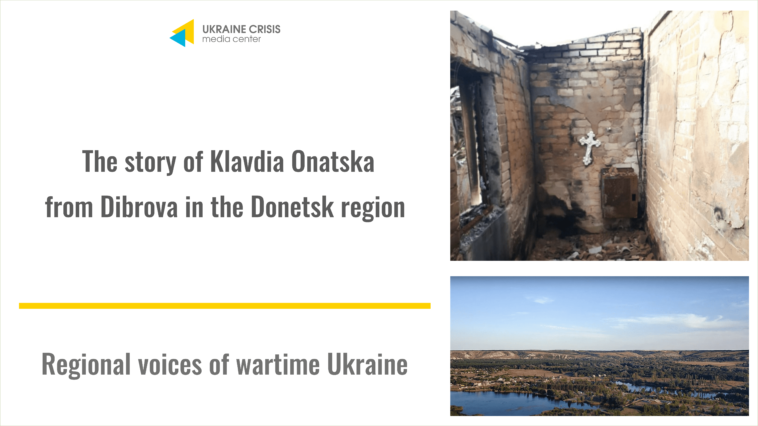Human lives torn to pieces, shattered dreams, painful memories, fear and anxiety, lost sense of security, deep personal wounds that will never heal. This is all the war that Russia has unleashed. Indirect victims of the war often go unnoticed – people who had no one to provide medical help because of shelling, those whose hearts simply could not bear what they saw. No one will ever count them. No one will ever be held responsible for them. The only thing we can do for them is to remember.
Home sweet home
The village of Dibrova in the Donetsk region is known for its amazing nature and picturesque landscapes. It is close to the Blue Lakes, the Siverskyi Donets River, pine forests, old mighty oaks. In recent years, Dibrova started to turn into a vacationland. There were plenty of people who wanted to breathe clean air and enjoy the surrounding beauty. But there were also small houses, sometimes even old huts of local residents among numerous new and rich mansions. Klavdia Vasylivna Onatska lived in one of those houses on Sonyachna Street.
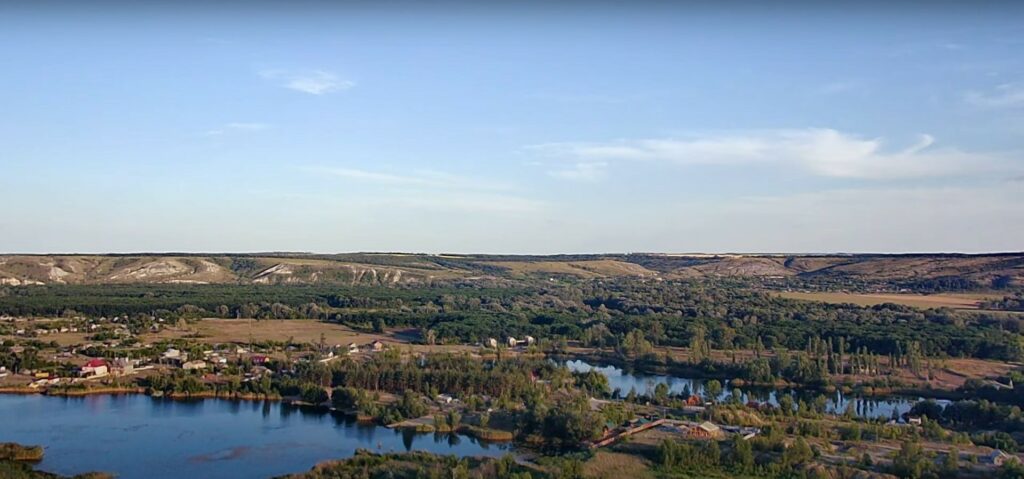
“The house was built around 1955. I was born in it. We all lived together: my grandparents, my aunt, my mother and I,” the woman recalls.
After graduating, she worked in Novomayorsk and later in Lyman.
In the 1990s, the girl returned to her home village. There was no job in the city, and her health deteriorated significantly – due to a serious illness, Klavdia became disabled. There was another reason for returning – she had to take care of her elderly mother, who had almost completely lost her sight by then.
The woman took care of her mother for eight years, until her death.
When fate smiled on her
Over the years, Klavdia Vasylivna accepted the idea that she wouldn’t have a family, and living alone wasn’t so bad. After all, she has relatives, friends, and neighbors. She didn’t expect any miracle, but it did happen.
Petro was not a very special man. At first, they didn’t talk much – the man came from the city to help his relatives build a summer cottage only on weekends. But the woman really liked him – he was hardworking and polite. Now Klavdia Vasylivna looked forward to every Saturday, and the man didn’t miss the opportunity to meet and talk with his neighbor. After a while, Petro moved to Dibrova, to a small house, to his Klavdia. The woman was happy. Nothing seemed to be able to destroy this happiness.
Futile hopes
On February 24, 2022, Klavdia Vasylivna turned on the TV in the morning and learned the terrible news – a great war had broken out.
“There was still electricity, the television was working. It wasn’t scary, but everything seemed to have frozen. We really hoped that the war would bypass our village, as it did in 2014. Back then, we would plant potatoes in Dibrova, and people in Sloviansk and Kramatorsk would suffer from shelling. So now, everyone thought we wouldn’t be affected. I sincerely believed in it. We didn’t even prepare a shelter at first; we were in the house all the time, although it was constantly ‘banging’ nearby. And in April, horror began in Dibrova. The electricity and gas disappeared. No shop, no medical service. Terrible shelling began. Shells fell one after another. It used to get worse in the evening. The whole streets were on fire. Lina Ivantsova and her mother lived opposite us. A shell hit their house, splitting it in half. The women hid in the cellar and were covered with debris. Fortunately, both survived, but the house burned down. They had a lot of firewood in the yard, and it all caught fire at once. The neighbors helped put it out. Back then, people tried to save at least something…” the woman recalls those dark days.
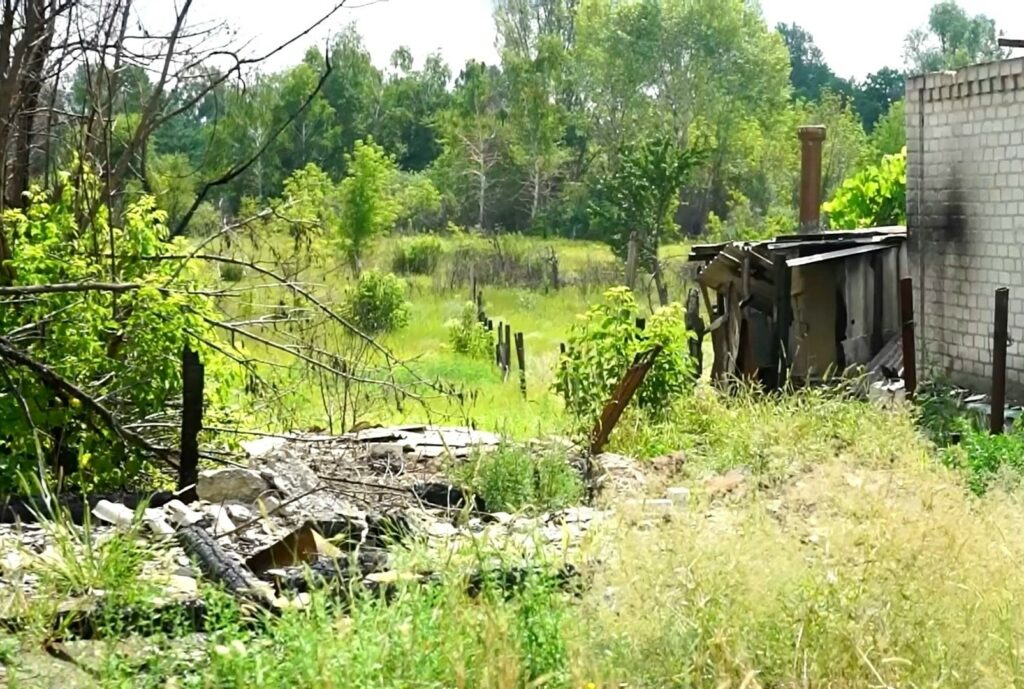
When asked if she could sleep at night, Klavdia Vasylivna answers:
“It was very noisy. Who could sleep there? No one slept. Sometimes I managed to doze off, but usually I didn’t. How can you sleep with fire all around you, everything whistling, rumbling, and the house shaking?”
Something she’ll never forget
In April, Peter fell ill.
“Before the full-scale war, his health began to deteriorate. We went to the hospital, had all tests done, but the doctors didn’t find anything. And when the big war began, he got worse. I remember we went to the neighbors to feed the animals. The owners left, but the dog and cats stayed behind. We went to feed them between shelling. Then Petro felt sick and said to me: “Klava, I can’t walk.” We stayed in the neighbor’s house for three or four hours, I kept waiting for him to get a little better. What could I do?” says the woman. “There was no one to call for help. I could barely drag him home. That’s when Petro lay down and never got up again. There was no way to call a doctor – the ambulance and hospital phones were no longer answering…”
When Petro became very ill, his relatives – his son and brother – somehow managed to get to Dibrova.
Klavdia Vasylivna’s voice changes when she tells us how her husband died. Her tone becomes somewhat emotionless, probably because all emotions have long since poured out along with tears:
“It seems to me that I remember every single moment, and as soon as I close my eyes, I replay everything in my head,” continues Klavdia. “When Petro died, I called the police twice. But they told me they couldn’t come because of heavy shelling. They told me to bury him on my own. My neighbors risked their lives to help me – they dug a grave in the cemetery. They and Petro’s son buried him. He has a good son – a student, studying IT in Kharkiv. I couldn’t even see my dear man off on his last journey. It was impossible to get to the cemetery on foot – the shelling was terrible then. The body was taken away in a car, and there was no place for me to sit. There was no coffin. The funeral service workers refused to go to the village – the road was constantly shelled. They wrapped my Petro’s body in a carpet and buried like that.”
Petro Karpenko was 65. He is also a victim of Russian aggression, because he would still be alive if he had had access to medical care. Thousands of people died in this way because of the war, and official statistics do not take them into account…
The way to safety
On May 4, nine days after Petro’s funeral, Klavdia Vasylivna left Dibrova. By that time, she could no longer stay in her house – all the windows and doors had been broken from explosions.
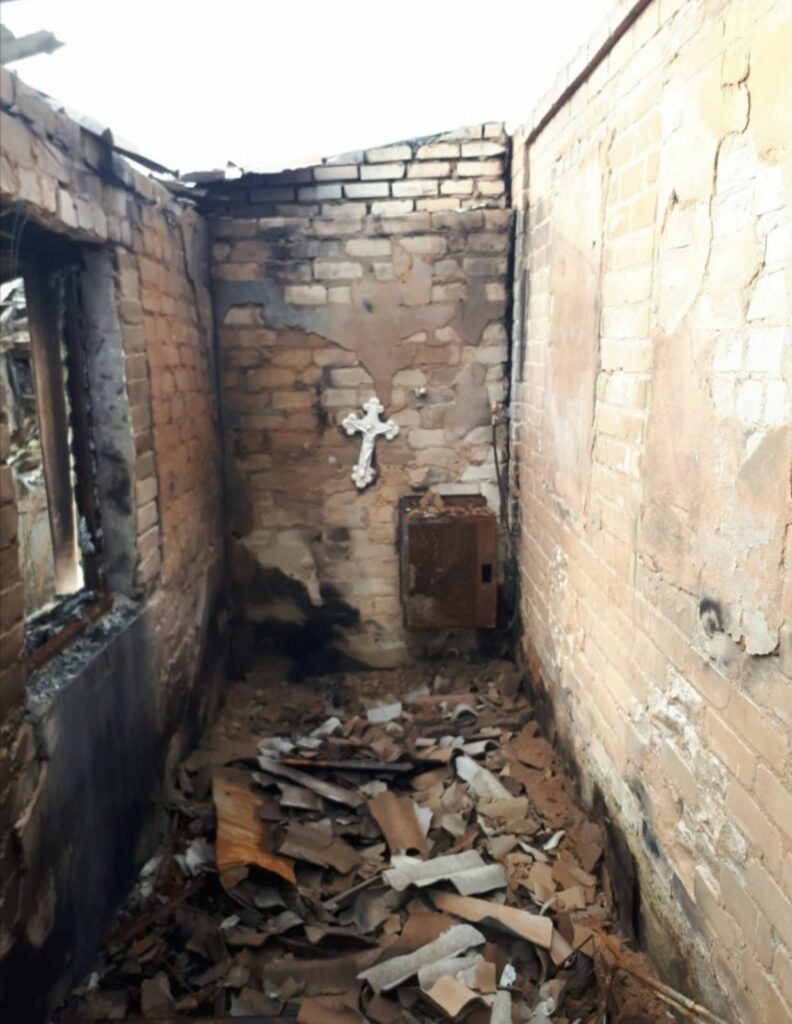
“On the very day Petro was buried, a shell exploded on the road right in front of my house. We were outside. The blast wave was so strong that it simply swept us into the summer kitchen. When I came inside, I saw that the entire floor was covered with small shards of glass. A few days later, a shell flew into our yard and exploded near the water pump. Then the roof of the house was turned 180 degrees. For several days, Petro’s son and I stayed in a neighbor’s surviving house. The shelling was terrible. Houses were burning, but people somehow united and helped each other. I heard that someone was taken away and there were two free places. They took us too,” the woman recalls.
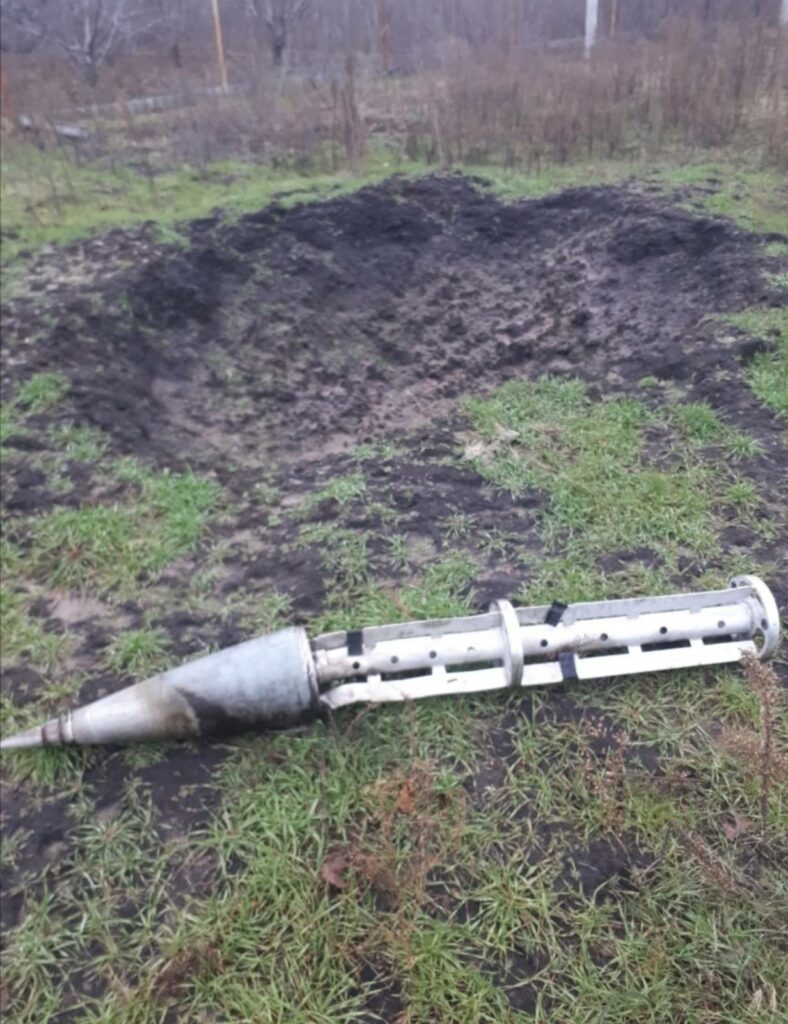
Klavdia Vasylivna packed very quickly, taking only her documents with her. Even her mobile remained in her old bathrobe pocket.
They moved not far away – to a small town, to Petro’s first wife. “Mom told me to take you to her place,” said the late man’s son firmly, and the woman agreed.
As it turned out later, it was a timely decision – a few days later, the Russians entered the village…
About good people and great hope
In a new place, Klavdia Onatska began to formalize her husband’s death certificate. It wasn’t easy to do.
“It was really hard. The call to the ambulance was not recorded. The police also said they had no data,” the woman says. “But when I applied again, they found the recording of my call to the police, and we were able to get all the documents.”
Now Klavdia Vasylivna lives in the house together with Petro’s ex-wife Svitlana. The women get along and do not want to go anywhere without each other. But it is dangerous in their town; the forest around them is mined. During the shelling, the Russians fatally wounded the husband of Svetlana’s cousin.
“Almost no one is left of our large family. Since the beginning of the war, since February 2022, I’ve lost nine relatives. Someone died from diseases, someone from wounds. My niece was shot by the Russians. I went to see my cousin in Siversk, which is under fire around the clock. I tried to persuade her to leave, but in vain… Our whole street was burned down. Large two-story houses were destroyed, metal fences were twisted. Only my neighbor Andriy’s house is relatively intact. My house was completely burned down by a hit in August, when Dibrova was on fire again. There was no one to put out the fire…” Klavdia Vasilivna cannot hold back her tears. “But the pride of Dibrova – our old oak tree – remained intact. A few branches are missing, but it is standing. Maybe our village will be revived. Of course, I won’t rebuild my house – I don’t have the strength. But my neighbors calm me down, promising that I will live with them.”
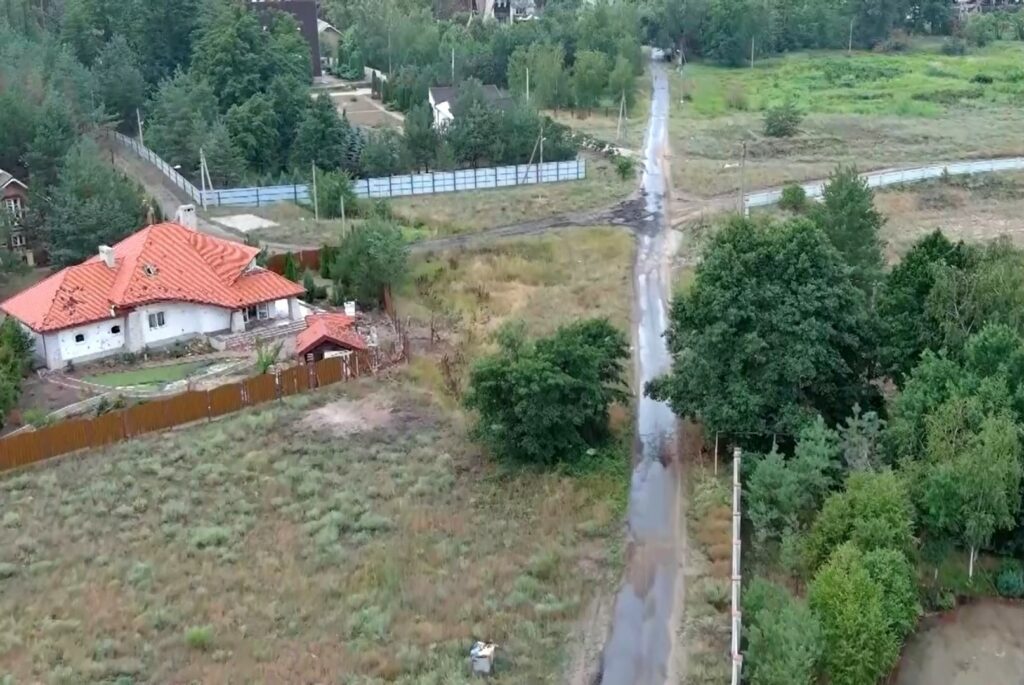
Dibrova is a de-occupied territory now, but the village is occasionally included in various reports as a settlement under fire. Being there is deadly dangerous. This was recently confirmed by another lost life of a local resident…
“I dream of returning,” the woman says. “Although I like Svitlana, we live like a family. And it isn’t far from our village – about ten kilometers. You’d think the nature is the same, but I am drawn to Dibrova.”
After the village was liberated, Klavdia Vasylivna went there several times – her neighbor Andriy, the one whose animals she and Petro fed, took her there.
In her home village, a completely destroyed yard awaits the woman.
Our conversation ends with her words, which are full of pain, but not without a bit of hope: “Everything there is a total wreck. In the middle of it is a stove. But I feel at home there…”
Author: Vira Ilyina
Supported by the U.S. Embassy in Ukraine. The views of the authors do not necessarily reflect the official position of the U.S. Government.

